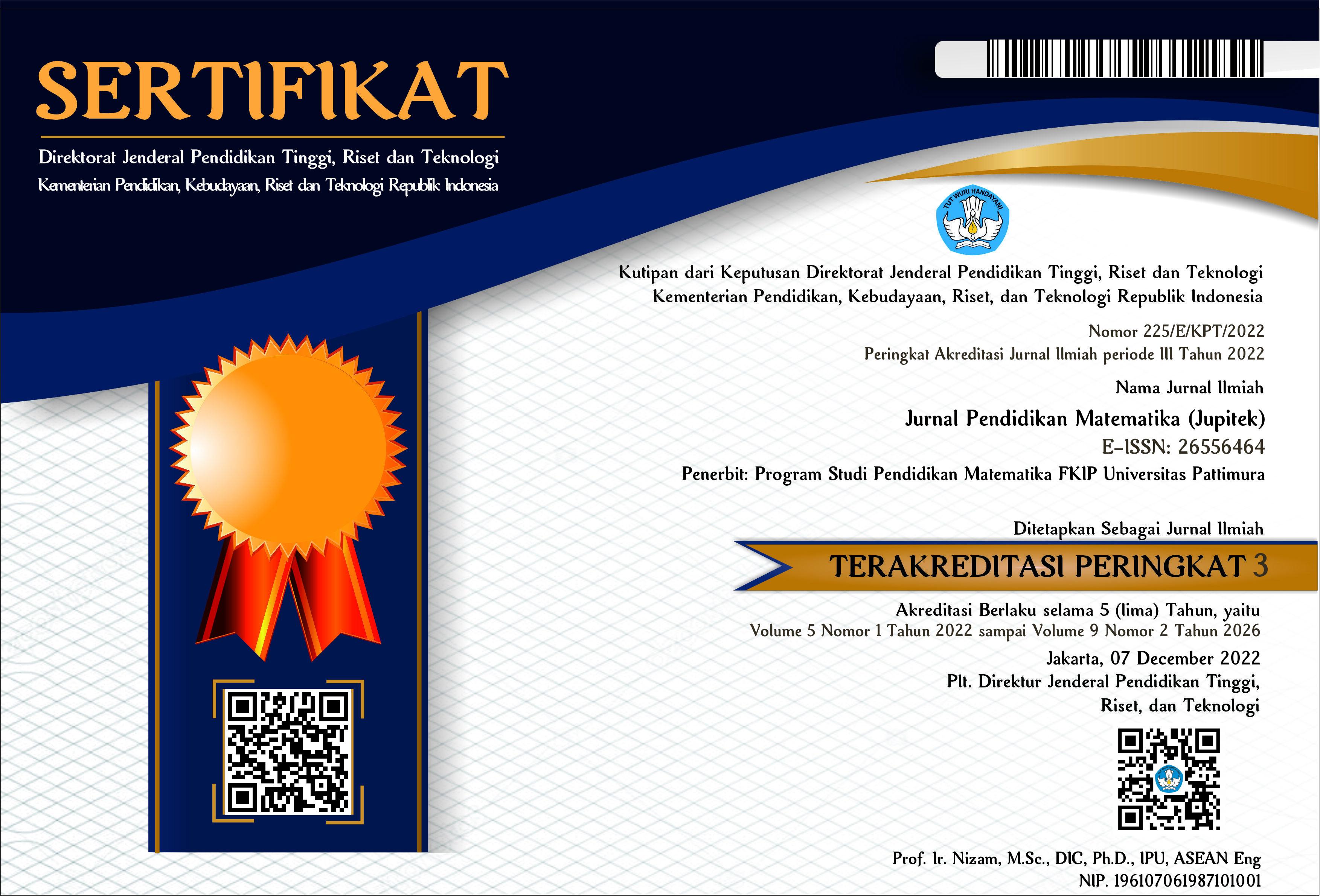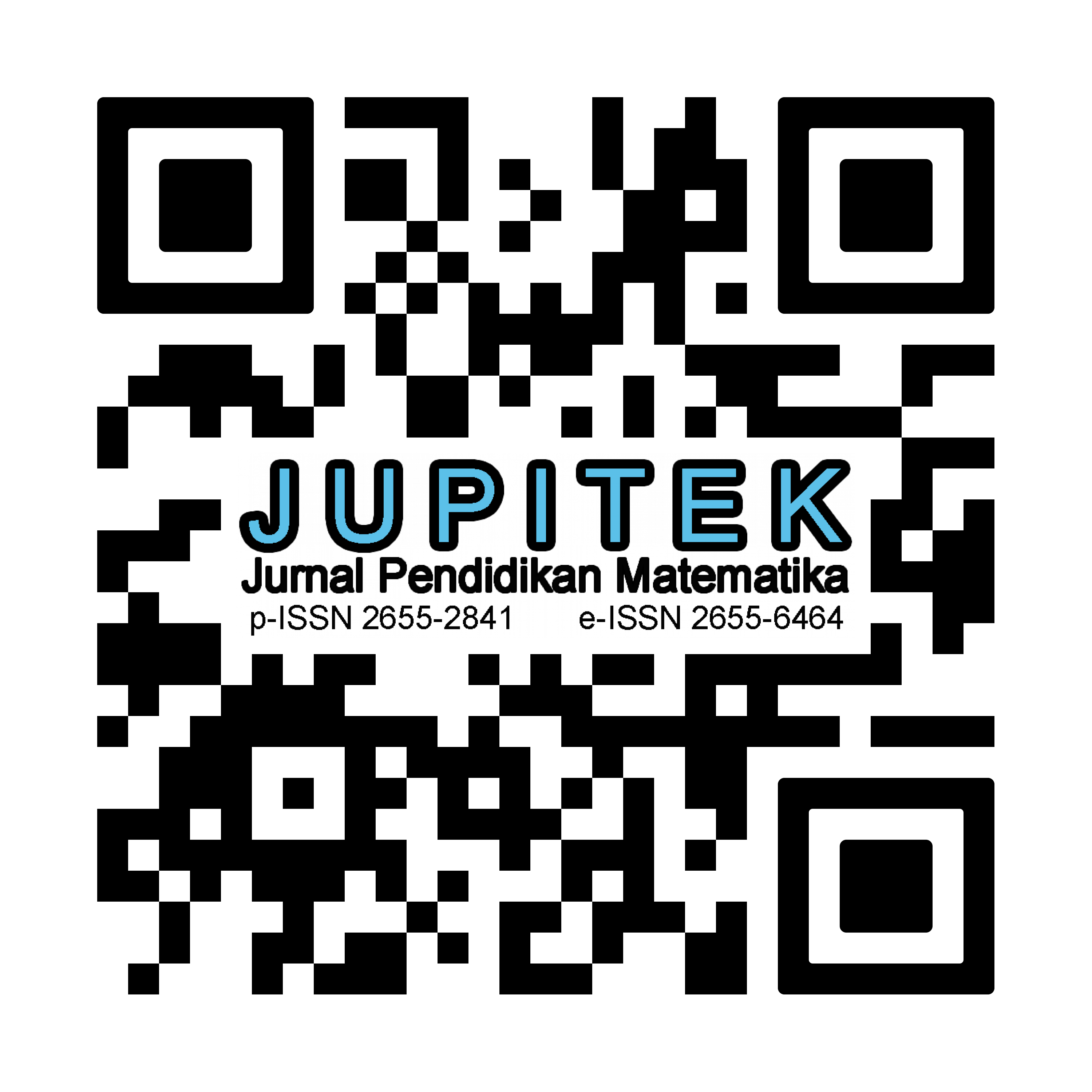Implementation of Problem-Based Learning Based on Mathematical Literacy to Improve Student’s Higher-Order Thinking Skills
Abstract
HOTS are high-level thinking skills that are important to have in the era of globalization to solve complex problems. However, many students still have relatively low HOTS, especially when the issue is relevant to everyday life. This study aims to see the effectiveness of implementing Problem-Based Learning (PBL) based on mathematical literacy in improving students' HOTS in class X MP 2 students of SMK Negeri 5 Madiun. This study is a classroom action research (CAR) carried out in two cycles, with 29 subjects from class X MP 2 SMK Negeri 5 Madiun. Each research cycle consists of four stages: planning, implementing actions, observation, and reflection. The main objective of this study is to determine whether implementing Problem-Based Learning (PBL) based on mathematical literacy can improve students' HOTS in mathematics learning. The study results showed a significant increase in students' HOTS after the implementation of PBL based on mathematical literacy. In the pre-cycle stage, students' HOTS was at 56.6%. After the actions were carried out in cycle I, students' HOTS increased to 71.8%, although it had not reached the expected completion criteria. In cycle II, there was another increase in students' HOTS to 79.2% which met the success criteria
Downloads
References
Antonio, R. P., & Prudente, M. S. (2023). Effects of Inquiry-Based Approaches on Students’ Higher-Order Thinking Skills in Science: A Meta-Analysis. International Journal of Education in Mathematics, Science and Technology, 12(1), 251–281. https://doi.org/10.46328/ijemst.3216
Asriningtyas, A. N., Kristin, F., & Anugraheni, I. (2018). Penerapan Model Pembelajaran Problem Based Learning Untuk Meningkatkan Kemampuan. Jurnal JKPM, 5(1), 5–10.
Dinni, H. N. (2018). HOTS (High Order Thinking Skills) dan kaitannya dengan kemampuan literasi matematika. PRISMA, Prosiding Seminar Nasional Matematika, 1, 170–176. https://journal.unnes.ac.id/sju/index.php/prisma/article/view/19597
Erria, R., Buyung, B., Nirawati, R., & Paruntu, P. E. (2023). Pengaruh Problem Based Learning Terhadap Literasi Matematika. Journal of Educational Review and Research, 6(1), 78. https://doi.org/10.26737/jerr.v6i1.4690
Febita, F., Andari, T., & Lusiana, R. (2024). Pengembangan E-Lkpd Berbasis Problem Based Learning Dalam Melatih Kemampuan Berpikir Kritis. Lemma, 10(2), 161–171.
Gusteti, M. U., & Neviyarni, N. (2022). Pembelajaran Berdiferensiasi Pada Pembelajaran Matematika Di Kurikulum Merdeka. Jurnal Lebesgue : Jurnal Ilmiah Pendidikan Matematika, Matematika Dan Statistika, 3(3), 636–646. https://doi.org/10.46306/lb.v3i3.180
Handayani, P. (2021). Study Literature Applying Higher Order Thinking Skills (HOTS) Oriented Learning with the PBL Model. Social, Humanities, and Education Studies (SHEs): Conference Series, 4(5), 205–211.
Hastawan, I., Chrysti Suryandari, K., & Ngatman. (2024). Penerapan Model Problem-Based Learning untuk Meningkatkan Kemampuan Berpikir Kritis. Buletin Pengabdian Multidisiplin, 1(1), 51–55. https://doi.org/10.62385/budimul.v1i1.97
Hasyim, M., & Andreina, F. K. (2019). Analisis High Order Thinking Skill (Hots) Siswa Dalam Menyelesaikan Soal Open Ended Matematika. FIBONACCI: Jurnal Pendidikan Matematika Dan Matematika, 5(1), 55. https://doi.org/10.24853/fbc.5.1.55-64
Hirda Yanti, A. (2017). Penerapan Model Problem Based Learning (Pbl) Terhadap Kemampuan Komunikasi Dan Kemampuan Pemecahan Masalah Matematika Siswa Sekolah Menengah Pertama Lubuklinggau. Jurnal Akuntansi, 11(2), 118–129.
Husnidar, H., & Hayati, R. (2021). Penerapan Model Pembelajaran Problem Based Learning Untuk Meningkatkan Hasil Belajar Matematika Siswa. Asimetris: Jurnal Pendidikan Matematika Dan Sains, 2(2), 67–72. https://doi.org/10.51179/asimetris.v2i2.811
Irmawati, R., Rahayu, A., & Ratnasari, S. (2022). Analisis Kemampuan Pemecahan Masalah Matematis Siswa Dalam Menyelesaikan Soal Higher Order Thinking Skills (HOTS) Pada Materi Aljabar. Jurnal PEKA (Pendidikan Matematika), 6(1), 1–9. https://doi.org/10.37150/jp.v6i1.1546
Kurniawan, H. S., & Khotimah, R. P. (2022). Profil Kemampuan Literasi Matematis Siswa Dalam Menyelesaikan Soal High Order Thinking Skill. AKSIOMA: Jurnal Program Studi Pendidikan Matematika, 11(3), 1966. https://doi.org/10.24127/ajpm.v11i3.5563
Launuru, A., Rumahlatu, D., & Matdoan, M. N. (2021). PjBL-HOTS learning model: Its application and effect on cognitive learning outcomes, critical thinking, and social attitudes. BIOEDUPAT: Pattimura Journal of Biology and Learning, 1(1), 1–10. https://doi.org/10.30598/bioedupat.v1.i1.pp1-10
Lusiana, R. (2017). Analisis Kesalahan Mahasiswa Dalam Memecahkan Masalah Pada Materi Himpunan Ditinjau Dari Gaya Kognitif. Jurnal Penelitian Dan Pembelajaran Matematika, 10(1), 24–29. https://doi.org/10.30870/jppm.v10i1.1290
Lusiana, R., & Andari, T. (2020). Brain based learning to improve students’ higher order thinking skills. Journal of Physics: Conference Series, 1613(1). https://doi.org/10.1088/1742-6596/1613/1/012004
Lusiana, R., Suprapto, E., & Sukristini, I. (2021). Efektivitas Model Pembelajaran Problem Based Learning (PBL) terhadap Prestasi Belajar Matematika Ditinjau dari Adversity Quotient (AQ). Edumatica: Jurnal Pendidikan Matematika, 11(2), 55–63.
Madyaratri, D. Y., Wardono, & Prasetyo, A. P. B. (2019). Kemampuan literasi matematika siswa pada pembelajaran problem based learning dengan tinjauan gaya belajar. Prisma, Prosicing Seminar Nasional Matematika, 2, 648–658. https://journal.unnes.ac.id/sju/index.php/prisma/article/view/29213
Marlina, M., Nasrullah, A., Mahuda, I., & Junedi, B. (2020). Implementasi Problem Based Learning (PBL) untuk Mendukung Kemampuan Literasi Matematis Mahasiswa Calon Guru. Jurnal Penelitian Pembelajaran Matematika, 13(02), 209–225. https://jurnal.untirta.ac.id/index.php/JPPM/article/view/8624/pdf_25
Muhammad Djajadi. (2019). Classroom action research - Penelitian tindakan kelas. In Workshop on Teaching Grant for Learning Innovation (Issue 16).
Nurhayati, N., Zuhra, F., & Salehha, O. P. (2021). Penerapan Model Pembelajaran Project Based Learning Berbantuan Geogebra Untuk the Application of Geogebra-Assisted Project Based Learning Model To Improve Student. JUPITEK (Jurnal Pendidikan Matematika), 4(2), 73–78.
Prihantoro, A., & Hidayat, F. (2019). Melakukan Penelitian Tindakan Kelas. Ulumuddin : Jurnal Ilmu-Ilmu Keislaman, 9(1), 49–60. https://doi.org/10.47200/ulumuddin.v9i1.283
Sa’adah, A., Ningrum, F. Z., & Farikha, N. (2021). Scaffolding dalam Pembelajaran Trigonometri Berbantuan Soal Hots untuk Meningkatkan Kemampuan Literasi Numerasi Matematika. Seminar Nasional Pendidikan Matematika UNIKAL, 2(1), 167–174. https://proceeding.unikal.ac.id/index.php/sandika/article/view/556
Safitri, A., Lusiana, R., & Adamura, F. (2024). Karakteristik Kemampuan Berpikir Kritis Siswa SMA dengan Kemampuan Kognitif Tinggi dalam Pemecahan Masalah Matematika. 9(1), 14–29.
Setiawan, A., & Santosa, R. H. (2017). Efektivitas Model Problem Based Learning Ditinjau Dari Kemampuan Pemecahan Masalah Dan Kreativitas Matematis the Effectiveness of Problem Based Learning Model in Terms of Problem Solving Skill and Mathematical Creativity. Jurnal Pendidikan Matematika, 6(2), 41–47. https://journal.student.uny.ac.id/index.php/jpm/article/download/5980/5714
Sinaga, fadhillatu J. (2021). Pengembangan Instrumen Penilaian Berbasis HOTS (Keterampilan Berpikir Tingkat Tinggi). Pendasi: Jurnal Pendidikan Dasar Indonesia, 5(2), 246–257. http://digilib.unimed.ac.id/id/eprint/41229
Tabun, H. M., Taneo, P. N. L., & Daniel, F. (2020). Kemampuan Literasi Matematis Siswa pada Pembelajaran Model Problem Based Learning (PBL). Edumatica : Jurnal Pendidikan Matematika, 10(01), 1–8. https://doi.org/10.22437/edumatica.v10i01.8796
Ultra Guesteti, M., & Neviyarni. (2022). PEMBELAJARAN BERDIFERENSIASI PADA PEMBELAJARAN MATEMATIKA DI KURIKULUM MERDEKA. Jurnal Ilmiah Pendidikan Matematika, Matematika Dan Statistika, 3(3), 636–646. https://doi.org/10.4324/9781003175735-15
Unaradjan, D. D. (2019). Metode Penelitian Kuantitatif (K. Sihotang (ed.)). Penerbit Universitas khatolik Atma Jaya.
Utami, N. D. (2023). Penerapan Pendekatan Kontekstual untuk Meningkatkan Kemampuan Pemecahan Masalah Matematis Siswa Sekolah Dasar. Jurnal Pendidikan Guru Sekolah Dasar, 1(2), 9. https://doi.org/10.47134/pgsd.v1i2.134
Wulandari, S., & Badjeber, R. (2023). Efektivitas Model Pembelajaran Problem Based Learning (PBL) Terhadap Kemampuan Literasi Matematis Peserta Didik MTS. Guru Tua : Jurnal Pendidikan Dan Pembelajaran, 6(2), 48–56.
Yanti, I., Asiani, R. W., & Kukuh, M. (2022). Students’ Mathematical Literacy in Solving Higher Order Thinking Skill Problems on Matrix Material. Jurnal Pendidikan Matematika (JUPITEK), 5(2), 175–186. https://doi.org/10.30598/jupitekvol5iss2pp175-186

Copyright (c) 2025 Astri Eka Rahmawati, Restu Lusiana, Sri Wahyu Utami

This work is licensed under a Creative Commons Attribution-NonCommercial-ShareAlike 4.0 International License.
License and Copyright Agreement
By submitting a manuscript to Jurnal Pendidikan Matematika (JUPITEK), the author(s) certify and agree to the following terms:
- Originality and Authority: The submitting author is authorized by all co-authors to enter into this agreement. The manuscript describes original work that has not been published previously in a peer-reviewed journal, nor is it under consideration for publication elsewhere.
- Approval: Its publication has been approved by all author(s) and by the responsible authorities of the institutions where the work was carried out.
- Rights: The authors secure the right to reproduce any material that has already been published or copyrighted elsewhere.
- Licensing and Copyright: Authors retain the copyright to their work.
- License Grant: The authors grant Jurnal Pendidikan Matematika (JUPITEK) the right of first publication, with the work simultaneously licensed under the Creative Commons Attribution-NonCommercial-ShareAlike 4.0 International (CC BY-NC-SA 4.0).
- Self-Archiving: Authors are permitted and encouraged to deposit the published version of their article in institutional repositories, on their personal websites, and other academic platforms, with proper acknowledgment of its initial publication in Jurnal Pendidikan Matematika (JUPITEK).





.png)


